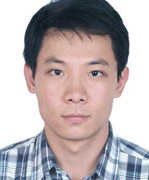
Hebei province, China
Master Research Project: Real-time Animation of Grass
The aim of this project is to create a frame work that can simulate a huge and cost effective eco system with believable physics model to improve player¡¯s experience.
work that can simulate a huge and cost effective eco system with believable physics model to improve player¡¯s experience.
A billboards based grass system has been implemented in GPU and can be integrated in TQ Rally. It simulated wind and multiple moving objects interact with huge number of grass. The grass can bend and recover realistically while a track may be left on the field.
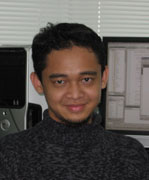
Indonesia, Pontianak
Managing and Rendering Large Terrains
The aim of this project is to construct and render large terrain in the real time.
After reading some research paper, I decide to use 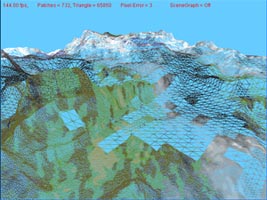 GeoMipMap and GeoClipMap algorithm since it gives best result when used together with 3d hardware
rendering.
GeoMipMap and GeoClipMap algorithm since it gives best result when used together with 3d hardware
rendering.
The characteristics of this algorithm:
1. De-emphasizing global optimization of the LOD procedure.
2. Maximizing the use of GPU.
3. Using triangle patches of clusters as basic elements.
The project is divided into three parts:
1. Scene Graph.
2. Terrain Rendering
3. Streaming Height Map data
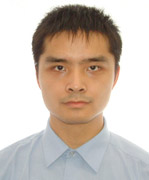
Shanghai,China
Water Simulation using GPU physics for Games
The project focuses on wave simulation to produce fast and realistic interaction between cars and water surface for video game. The simulated wave is represented by a mesh. 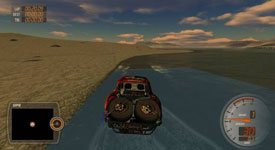 The height of each vertex of the mesh is modified using Vertex Texture Fetching, a Shader technique from a dynamic updated height map. The height field method is used as it is the fastest method and complies with GPU architecture and Shader programming. Basic 2D wave equation is used as simulation function to generate the height map in real-time.
The height of each vertex of the mesh is modified using Vertex Texture Fetching, a Shader technique from a dynamic updated height map. The height field method is used as it is the fastest method and complies with GPU architecture and Shader programming. Basic 2D wave equation is used as simulation function to generate the height map in real-time.
Current version of wave simulation is called Adhesive Version. The basic concept is that wave simulation grid is not attached with every water surfaces, but with every cars in the game. The grid moves together with each car, and simulation starts when the car is inside water surface with a diction algorithm. This implementation minimizes the area required for simulation, which saves certain amount of computational cost.
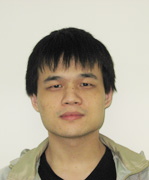
Luoyang, Henan, China
Network for racing game
Objective:
To create a network framework for racing game using.
Brief Description:
The network framework is used to support for networked racing game. The framework should support for at least 16 players playing together. Bandwidth saving, prediction algorithm and interpolation algorithm are used to make the game more playable and realistic.
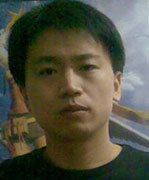
Dan Dong, Liao Ning, China
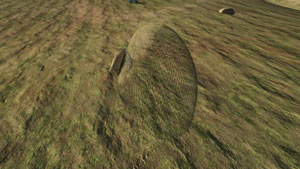 Skills: C++, Java
Skills: C++, Java
Company: TQ Singapore
Graduation Thesis or Project: Real-time subdivision on game applications.

Singapore
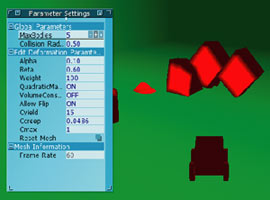
- C/C++, Win32
- OpenGL, GLSL, DirectX, DirectShow, HLSL, CG
- Alias Maya API and Mel Scripts
- Flash Actionscript 3.0
- Java Technologies: J2SE, J2ME and J2EE
- Windows 95/98/2000/XP/Vista Family
- Linux/Unix
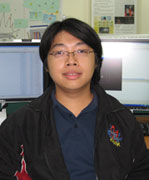
Jakarta, Indonesia
Neural Network for Racing AI
Objective: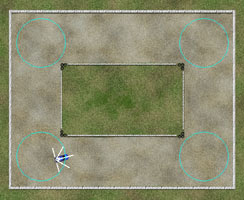
To create a neural network-based Racing AI that is able to self-learn how to race around the racing track and to improve its performance by learning from its opponents.
Brief Description:
After several experiments with various learning algorithms for neural network, a generic multi-layer neural network (MLP - multi-layer perception network) framework based on Neuron Evolution training algorithm is implemented for this purpose. Neuron Evolution is a neural network that uses Genetic Algorithm (GA) to modify its weights and connections topology. This method is suitable due to the insufficient training data available for the AI. By using GA, the network doesn't need any training data. GA will update the network based on its performance during the race which is easier for the developer to train the AI without the needs to manually provide the data (e.g by playing the game over and over). This network is suitable for racing AI because it allows the network to evolve and achieve better results for racing AI.
